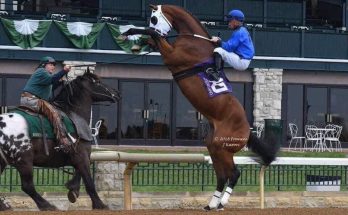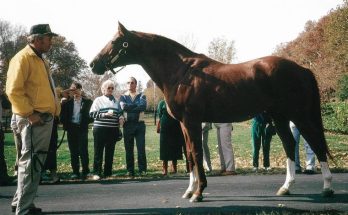The journey began under the bright skies of Churchill Downs, where the Kentucky Derby awaited. As the gates flew open, Secretariat settled into his rhythm, biding his time as the field thundered around the track. Then, as they charged into the homestretch, he made his move. His greatest rival, Sham, fought to keep up, but Secretariat had another gear—one no other horse could match. With each stride, he pulled ahead, crossing the finish line two lengths in front. It was the fastest Derby ever run.
Two weeks later, at Pimlico Race Course, the Preakness Stakes unfolded in dramatic fashion. The crowd gasped as Secretariat, without warning, surged forward on the first turn—a bold, unexpected move rarely seen so early in a race. His jockey, Ron Turcotte, simply let him go. The colt’s acceleration was breathtaking, his speed almost supernatural. He stormed ahead, never looking back, and claimed the second jewel of the Triple Crown.
But it was at Belmont Park, on a warm June afternoon, that Secretariat became a legend. The air was thick with anticipation. No horse had won the Triple Crown in 25 years, and many doubted it would ever happen again. As the race began, Secretariat and Sham locked into an early duel, matching each other stride for stride. Then, on the backstretch, it happened.
Secretariat began to pull away. First by a length. Then two. Then five. The crowd roared as the gap widened. The chestnut colt, bathed in sunlight, was running as if he had no limits. His strides were impossibly smooth, his speed increasing rather than fading. The rest of the field was left in the distance, struggling to keep up. By the final turn, Secretariat was alone—his lead stretching with every powerful step.
As he charged toward the wire, 31 lengths ahead, the crowd was no longer cheering; they were in awe. It was not just a victory—it was domination, a performance so perfect that it seemed almost unreal. He shattered the world record for a mile and a half, a time that still stands today.
In that moment, Secretariat became immortal. He had not just won the Triple Crown—he had redefined what a racehorse could be.



